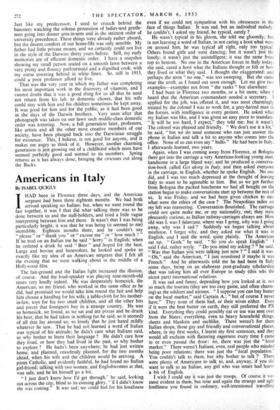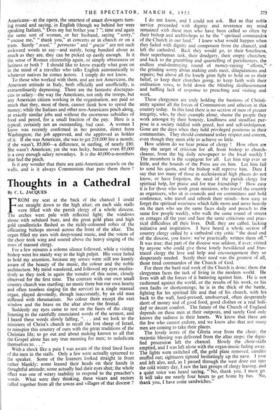Americans in Italy
By ISABEL QUIGLY IHAD been in Florence three days, and the American sergeant had been there eighteen months. We had both arrived speaking no Italian; but, when we went round the fair together, it was I that did what talking there was to be done between us and the stall-holders, and tried a little vague interpreting between him and them. It wasn't that I was being particularly bright; it was that he was being (it seemed to me) incredible. Eighteen months there, and he' couldn't say " please " or " thank you " or " excuse me" or " how much ? ". If he trod on an Italian toe he said " Sorry " in English; when he ordered a drink he said " Beer " and hoped for the best. Large and bovine and benevolent, he looked and spoke so exactly like my idea of an American sergeant that I felt. the evening that we were walking about in the middle of a Hollywood film. s_ The fair-ground and the Italian light increased the illusion, of course. And the loud-speaker was playing nine-month-old tunes very loudly indeed. He was desperately homesick, the American; so my friend, who worked in -the same office as he did, had promised we would take him round the fair and help him choose a handbag for his wife, a table-cloth for his mother- in-law, toys for his two small children, and all the other bits and pieces that foreigners buy in a strange country. He was so homesick, we found, as we sat and ate pizzas and he drank his beer, that he had taken in nothing (so he said, so it seemed) of all that lay around us; so lonely that he just hated mildly whatever he saw. That he had not learned a word of Italian was typical of his attitude; he didn't care what Italians said, so why bother to learn their language ? He didn't care how they lived, or how they had lived in the past, so why bother to explore ? He hadn't been anywhere; he had just written home, and planned, ceaselessly planned, for the two months ahead, when his wife and the children would be arriving. A pious Catholic, and evidently faithful, he had found no Italian girl-friend; talking with two women, and Englishwomen at that, was safe, and he let himself go a bit.
" I just don't know how I'd get through," he said, looking out across the city, blind to its evening glory, " if I didn't know she was coming." It was sad; we could feel for his loneliness even if we could not sympathise with his obtuseness in the face of things Italian. It was sad, but an individual malady ; he couldn't, I asked my friend, be typical, surely ? He wasn't typical in his gloom, she told me gloomily; but in not learning a word of Italian, in not caring a hoot what went on around him, he was typical all right, only too typical. Others found girls and went dancing; but it wasn't just the lonely; it wasn't just the unintelligent; it was the same from top to bottom. No One in the American forces in Italy today, she said, cared a hoot what the Italians thought or felt or how they lived or what they said. I thought she exaggerated; and perhaps the term " no one," was too sweeping. But she came near the truth, as I found out soon enough. Let me give two examples—examples not from " the ranks " but elsewhere.
I had been in Florence two months, or a bit more, when I heard that the American commandant needed a secretary. I applied for the job, was. offered it, and was most charmingly treated by the colonel I was to work for, a grey-haired man in the forties, with intelligence in every gesture. He asked what my Italian was like, and I was given an easy piece to translate. " It will be too hard, I expect," they told me; but it wasn't. The colonel was pleased and friendly. " We don't use it a lot," he said, " but we do need someone who can just answer the phone in Italian and talk a bit to anyone who comes into the office. None of us can even say " hullo." He had been in Italy, 1 afterwards learned, two years.
Again, when I was coming away from Florence, at Bologna there got into the carriage a very American-looking young man, handsome in a large bland way; and he produced a conversa- tion-book called Get along in Italy, and then asked everyone in the carriage, in English, whether he spoke English. No one did, and I was too much depressed at the thought of leaving Italy to want to be agreeable to him. But as we got further from Bologna the packed luncheons we had all bought on the station began to make conversations start up between the rest of us. It was Friday, and we had been given chicken to eat: what-were the ethics of the case ? The Neapolitan tailor on my left was reassuring. Conversation flourished. The carriage could not. quite make me, or- my nationality, out; they were pleasantly curious, asItalian'railway-carriages always are. How old-Was L was-I fidanzata, where was I going, why was I going away, why was -I sad ? Suddenly we began talking about mistletoe, I forget why, and they asked me what it was in English, and I said the word, quite plainly. The American sat up. " Gosh," he said. " So you do speak English." I said. I did, rather wryly. " Do you mind my asking ? he said. "-Was that Italian you were talking just now ? "I said it was. "-Oh," said the Adierican, " I just wondered if maybe it was French." And he' afterwards told me he had been in Italy some days, being on an elaborate post-graduate scholarship that was taking him all over Europe to study- .(this was the nicest part) international relations.
It was sad- and funny, depending how you looked at it; not so much- the tourists (they are too easy game, and often charm- ing) as the soldiers and airmen. " I suppose you can buy butter on the local market," said Captain A.; but of course I never have." They none of them had, or their wives either. Even if it were the best butter on earth, they still preferred the PX kind. Everything they could possibly eat or use was sent over from the States;- everything, even to heavy household things, sheets and blankets and suchlike. There weren't for them Italian shops, those gay and friendly and conversational places, where, in my first weeks, I learnt my first sentences, and they would all exclaim with flattering eagerness every time I came in or even passed the door: no, there was just the " local market." There weren't Italians, even, real people who minded being poor relations; there was just the " local population." You couldn't talk to them, but why bother to talk ? There were plenty of Americans to talk to, and, anyway, if you did want to talk to an Italian, any girl who was smart had learnt a bit of English.
I wish I could say it was just the troops. Of course it was most evident in them, but time and again the strange and ugly lordliness you found in ordinary, well-intentioned travelling Americans—at the opera, the smartest of smart dowagers turn- ing round and saying, in English (though we behind her were speaking Italian), "Does my hat bother you ? "; time and again the same sort of woman, or her husband, saying " sorry," " excuse me," " thank you," at concerts or in church or on a tram. Surely "scusi," "permesso " and "grazie " are not such awkward words to say—and surely, being bandied about as much as they are, they can be picked up easily enough. Is it the sense of Roman citizenship again, or simply obtuseness or laziness or both ? I should like to know exactly what goes on in the mind of a traveller who talks English automatically to whatever natives he comes across. I simply do not know. To those who worked with them, and are not Americans, the American attitude in Italy, both officially and unofficially, is extraordinarily depressing. There are the fantastic discrepan- cies in salary—the way the Americans, not only the troops, but any American citizen working in the organisation, are paid so much that they, most of them, cannot think how to spend the money; while the Italians and other non-Americans pinch along, at exactly similar jobs and without the enormous subsidies of food and petrol, for a small fraction of the pay. Here is a typical, certainly not an outstanding, bad case. A woman I know was recently confirmed in her position, direct from Washington; the job approved, and she appioved as holder of it. If she was American, she was to get 218,000 lire a month; if she wasn't, 85,000 a difference, in sterling, of nearly £80. She wasn't American; yet she was lucky, because even 85,000 is a cosy enough salary nowadays. It is the 40,000-a-monthers that feel the pinch.
Is it any wonder that there are anti-American scrawls on the walls, and is it always Communism that puts them there ?



































 Previous page
Previous page